第一周补充阅读材料
七年级梦飞翔阅读教学计划

七年级梦飞翔阅读教学计划教学目标:1. 帮助学生提高阅读理解能力;2. 培养学生的阅读兴趣和习惯;3. 提升学生的词汇量和语言表达能力。
教学内容:1. 梦飞翔课本中的课文和相关阅读材料;2. 丰富多样的阅读练习题;3. 生活实际中的阅读材料。
教学步骤:第一周:课本阅读1. 给学生颁发梦飞翔课本,并介绍课本中的课文内容;2. 每天安排30分钟课堂时间,让学生独立阅读课本中的课文;3. 老师逐一点评学生的阅读表现,鼓励他们提问和分享阅读体验;4. 在课堂结束时,布置课文的相关阅读练习题。
第二周:阅读练习1. 复习前一周学习的课文内容,进行互动讨论;2. 完成相关阅读练习题,并进行讲解和订正;3. 引导学生多使用课文中的词汇和句型进行口头表达;4. 补充其他阅读材料,如新闻、故事、科普文章等,帮助学生扩大阅读领域。
第三周:阅读技巧训练1. 介绍不同类型的阅读题型,如主旨理解、细节抓取、推理推断等;2. 根据学生的阅读水平和进度,布置对应难度的阅读练习题;3. 分析学生在阅读过程中出现的问题,并进行解答和指导;4. 提供有效的阅读策略和技巧,帮助学生提高解题速度和准确性。
第四周:实践阅读1. 利用学校图书馆或社区图书馆的资源,带领学生借阅适合自己阅读水平的图书;2. 学生选择自己感兴趣的书籍进行阅读,并进行书评和分享;3. 组织阅读活动,如朗读比赛、阅读分享会等,激发学生的阅读热情;4. 鼓励学生在日常生活中多阅读标识、广告、说明等实际阅读材料,加深对语言的理解和运用。
教学评估:1. 每周进行一次阅读理解测试,以检测学生的阅读能力和掌握程度;2. 随堂观察学生的阅读表现,及时调整教学方法和内容;3. 定期与学生进行个别面谈,了解他们的阅读习惯和兴趣,给予针对性的指导和建议;4. 收集学生的阅读笔记和反馈,以便掌握教学效果和改进教学计划。
教学反思与改进:1. 定期组织教师交流会,分享教学经验和心得体会;2. 听取学生和家长的意见和建议,持续改进和完善教学计划;3. 鼓励学生提出问题和困惑,及时解答并帮助他们解决;4. 关注学生的学习进展,及时调整教学进度和内容,确保教学目标的实现。
《朝花夕拾》整本书阅读实施方案
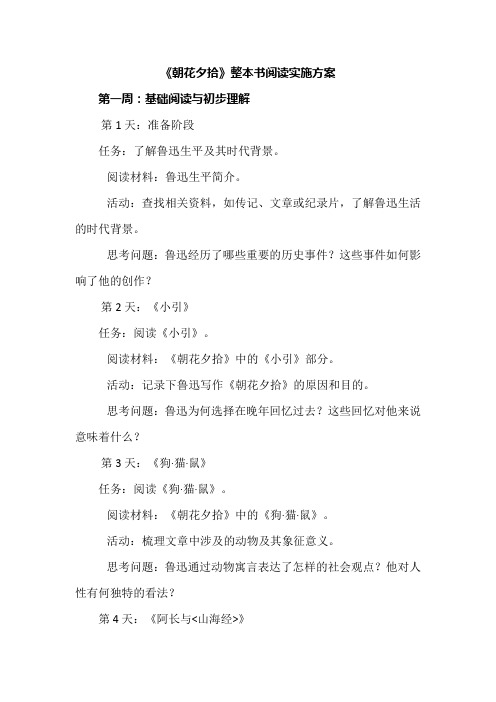
《朝花夕拾》整本书阅读实施方案第一周:基础阅读与初步理解第1天:准备阶段任务:了解鲁迅生平及其时代背景。
阅读材料:鲁迅生平简介。
活动:查找相关资料,如传记、文章或纪录片,了解鲁迅生活的时代背景。
思考问题:鲁迅经历了哪些重要的历史事件?这些事件如何影响了他的创作?第2天:《小引》任务:阅读《小引》。
阅读材料:《朝花夕拾》中的《小引》部分。
活动:记录下鲁迅写作《朝花夕拾》的原因和目的。
思考问题:鲁迅为何选择在晚年回忆过去?这些回忆对他来说意味着什么?第3天:《狗·猫·鼠》任务:阅读《狗·猫·鼠》。
阅读材料:《朝花夕拾》中的《狗·猫·鼠》。
活动:梳理文章中涉及的动物及其象征意义。
思考问题:鲁迅通过动物寓言表达了怎样的社会观点?他对人性有何独特的看法?第4天:《阿长与<山海经>》任务:阅读《阿长与<山海经>》。
阅读材料:《朝花夕拾》中的《阿长与<山海经>》。
活动:描述阿长的形象,并分析鲁迅对她的感情。
思考问题:鲁迅如何看待民间文化和传统习俗?阿长对鲁迅的成长有什么影响?第5天:《二十四孝图》任务:阅读《二十四孝图》。
阅读材料:《朝花夕拾》中的《二十四孝图》。
活动:挑选几个孝道故事,分析其背后的道德观念。
思考问题:鲁迅对传统孝道的看法是什么?他如何批判封建礼教?第6天:《五猖会》任务:阅读《五猖会》。
阅读材料:《朝花夕拾》中的《五猖会》。
活动:描述鲁迅对童年游戏的记忆。
思考问题:鲁迅对封建迷信的态度是什么?他对童年游戏的描写反映了什么?第7天:复习与总结任务:回顾本周所读文章。
活动:整理笔记,总结鲁迅早期生活经历对他的影响。
思考问题:这一周的阅读给你留下了哪些印象深刻的片段?你学到了什么?第二周:深入分析与拓展第8天:《无常》任务:阅读《无常》。
阅读材料:《朝花夕拾》中的《无常》。
活动:分析无常的形象及其象征意义。
小学三年级阅读练习每天一篇第一周
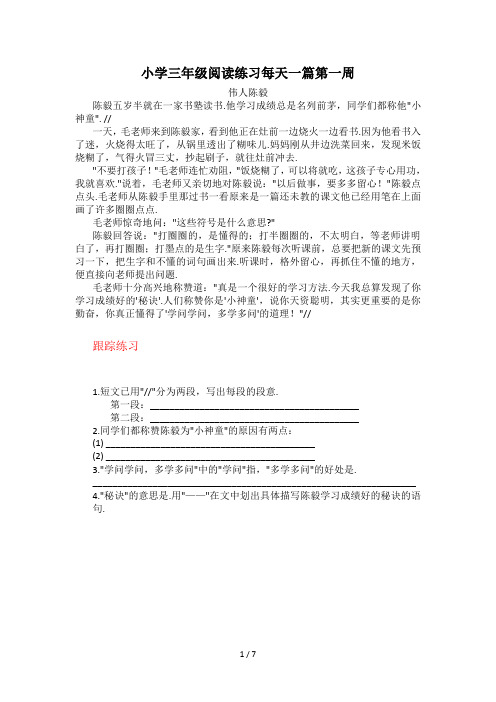
小学三年级阅读练习每天一篇第一周伟人陈毅陈毅五岁半就在一家书塾读书.他学习成绩总是名列前茅,同学们都称他"小神童". //一天,毛老师来到陈毅家,看到他正在灶前一边烧火一边看书.因为他看书入了迷,火烧得太旺了,从锅里透出了糊味儿.妈妈刚从井边洗菜回来,发现米饭烧糊了,气得火冒三丈,抄起刷子,就往灶前冲去."不要打孩子!"毛老师连忙劝阻,"饭烧糊了,可以将就吃,这孩子专心用功,我就喜欢."说着,毛老师又亲切地对陈毅说:"以后做事,要多多留心!"陈毅点点头.毛老师从陈毅手里那过书一看原来是一篇还未教的课文他已经用笔在上面画了许多圈圈点点.毛老师惊奇地问:"这些符号是什么意思?"陈毅回答说:"打圈圈的,是懂得的;打半圈圈的,不太明白,等老师讲明白了,再打圈圈;打墨点的是生字."原来陈毅每次听课前,总要把新的课文先预习一下,把生字和不懂的词句画出来.听课时,格外留心,再抓住不懂的地方,便直接向老师提出问题.毛老师十分高兴地称赞道:"真是一个很好的学习方法.今天我总算发现了你学习成绩好的'秘诀'.人们称赞你是'小神童',说你天资聪明,其实更重要的是你勤奋,你真正懂得了'学问学问,多学多问'的道理!"//跟踪练习1.短文已用"//"分为两段,写出每段的段意.第一段:__________________________________________第二段:__________________________________________2.同学们都称赞陈毅为"小神童"的原因有两点:(1) __________________________________________(2) __________________________________________3."学问学问,多学多问"中的"学问"指,"多学多问"的好处是._________________________________________________________________4."秘诀"的意思是.用"——"在文中划出具体描写陈毅学习成绩好的秘诀的语句.秋天的香山公园秋天的香山公园,以它独特的美迎接着众多的游人.走进公园大门,放眼望去,峰峦重叠,挺拔壮观.山上长满了各种树木,枝叶浓密,人走进去,便淹没在其中了.最引人注目的是那漫山遍野的红叶.近看红叶的形状不一,有长圆扁圆,扇形,还有三角形的.远看,山坡上树树交错,叶叶相连,层层叠叠相互辉映,映红了半边天空.在大片大片的鲜红中央杂着深黄色,褐色……就像千万只彩蝶上下飞舞,真是姿态万千,绚丽多彩.一阵爽人的秋风吹过,传来柔和的"沙沙"声,枝摇叶摆,像是在向游人频频招手.人们不由赞叹:"多美呀!香山的红叶."香山公园里潺潺的流水也很动人.小路旁,石缝里,溪水愉快地流淌着.阳光洒在水面上,闪着耀眼的光芒.有时,溪水聚在几块碎石中间,静静地躺着,小鱼儿在你追我赶地嬉戏.再看,路旁的花坛里,花儿展开笑脸,争芳斗艳.一串连成片,鸡冠顶起了花冠.那品种繁多的菊花,伸开了卷曲的花瓣;没有开放的花瓣紧缩着,像一个个彩球.不管是什么花,都散发出淡淡的清香.美丽的香山公园,使游人流连忘返.跟踪练习1.查字典."爽"用音序查字法应查_______音序,再查_______;用部首查字法应查_______部首,再查_______画.字典中的解释有:(1)明朗,清亮;(2)率直,痛快;(3)舒服;(4)违背."爽人的秋风"中"爽"应取第_______种解释.2.用"——"分别画出概括第3,4,5自然段意思的中心句.3.读第3自然段,作者是从__________,__________,__________三方面描写红叶的.4.第5自然段,写了__________,__________,__________三种花,是从__________,__________,__________三方面介绍的.5.这篇短文中,作者主要写了哪几种景物:________________________________________,表现了作者______________________________.6.用"﹏﹏"划出首尾照应的句子.公园一角最引人注目的是公园的一角.这里有一个圆形的喷水池,池中有一座别致的假山.池里的水清润(rùn)得宛如一块天然的翡(fěi)翠,平滑无暇,清澈见底.当微风拂过水面时,水面上就泛起层层鱼鳞般的波纹.池中的假山是由好几块奇石巧妙地堆成,很精巧.假山顶端喷出一股又细又高的水柱.那水柱喷出后,又斜落下来,成了一串银白的水珠,晶莹耀眼.微风吹过,犹如点点白梅撒在水面上,荡漾起一圈圈小小的涟漪(yī),飘散在空中,仿佛给假山披上一层轻纱,格外美丽.池中有许多色彩斑(bān)斓(lán)的金鱼,它们互相嬉(xī)戏,好不自在.瞧,一条花尾金鱼刚浮到水面上,嗖的一下,转头又钻入水底下去了.看,又来一条,眼睛大大的,鼓鼓的,穿着黑色的晚礼服,好像是要去参加隆重的盛会.它昂着头,不停地摆动着尾巴,像是在炫耀自己:"瞧,我多漂亮!"喷水池的周围,摆着一盆盆绽蕾吐艳的菊花.粉红色的花蕊嵌在金黄的花瓣中,在绿叶的映衬下显得格外鲜艳.微风吹来,菊花就像一个个少女在翩翩起舞.小池.假山.金鱼和菊花,构成了一幅美丽的图画.跟踪练习1.填空."翡翠"的"翡"用音序查字法应查大写字母;再查音节;用部首查字法,应查________部,再查_______画.第一画名称是________;"翠"与"翡"相比,从"羽"的写法上,你发现了________________________.2.选择下列句子中带点字的正确解释(将序号写在括号里)好:a,非常b,很多c,表示同意d,优点很多(1)它们互相嬉戏,好自在.( )(2)池中的假山是由好几块奇石巧妙地堆成,很精巧.( )盛:a,用力很大,程度深b,兴盛,旺盛c,盛大,隆重(1)春天是月季花盛开的季节.( )(2)看,又来一条,眼睛大大的,鼓鼓的,穿着黑色的晚礼服,好像是要去参加隆重的盛会.( )3.根据意思,在文中找出相应的词语,写在括号里.(1)夸耀.( )(2)新奇,跟平常不同.( )(3)形容轻快地跳舞.( )(4)吸引人们的注意力.( )4.在括号里填上适当的词语.( )的波纹披上( ( ) )鲜艳( )的花蕊钻入( ( ) )道歉5.造句(1)格外--_____________________________________________________(2)显得--_____________________________________________________7.用"——"画出文中打比方的句子.(最少三处).8.读短文,填空.(1)短文第一段有顺序地向我们介绍了.先写______________,再写______________.然后写______________.(2)第二自然段先概括写,再具体写.由面到点,具体细致,表达了作者对金鱼的______________之情.齐白石齐白石是我国杰出的画家,他的画举世闻名.许多人纷纷拜访齐白石,要他介绍经验,传授画画的秘诀.齐白石在一次接待客人时,诚恳地说:"作画并无秘诀,全在一天也不能空闲."这的确是他的经验之谈.齐白石从四十六岁起就定居北京,从那时开始,他坚持每天都要画画,从来没有间断过.他八十五岁那一年,有一天,一连画了四张画.这对他来说,已经是够累的了.但他还是继续画,坚持又画了一张.画完以后,他在画上题了几行字:"昨天大风雨,心绪不宁,不曾作画,今朝特此一张补充之,不教一日闲过也."跟踪练习1.选择带点字的意思(在括号里填上序号).(1)举:a,往上抬;b,提出c,全;d,推选举例( )举世闻名( )举目( )(2)杰:a,才能出众的人;b,超过一般水平.杰出( )杰作( )2.用"——"画出文中的中心句.3.齐白石在自己的画上题了这么几个字:"_______________________"."心绪不宁"的意思是;"不教一日闲过也"用文中的语句说是.老鼠买鱼一天,鼠倾巢出动,窜上大街要把所有的鱼全买下来.鱼行老板问:"你们不愁吃喝,买那么多鱼干啥?""虽不愁吃喝,可要平安无事总得破费些钱财呀!"老鼠狡黠地笑了笑.鱼行老板仍听不明白,却狠狠地敲起竹杠来.一下子,鱼价抬高了几倍.买完鱼后,小老鼠们有的把鱼扛在身上,有的举在头上,有的抱在手上.这时一个小老鼠跑到老鼠头领面前说头儿咱们买这么多鱼干啥呀老鼠头领说笨蛋咱们( )不愁吃( )有老猫就过不了安稳日子猫爱吃鱼咱们送些鱼不就和猫化敌为友了吗哈哈说着,露出得意的笑容.小老鼠仍听不明白,但也不想去问了,心想:头儿让我干啥,我就干啥.跟着头儿干准没错.( )老鼠把鱼买完了,( )街上没有鱼卖.猫只好自认晦( )气,运气不好.不过,从此每天都有老鼠给猫送鱼,猫非常高兴,果真与鼠"化敌为友"了.不久,该市鼠患成灾,鱼行老板这才猛然醒悟,叹息道:"我( )赚了钱,( )上了老鼠的当."跟踪练习1.选择带点字的意思(在括号里填序号)(1)费:a:费用b:花费c:复杂,不容易费事( )破费( )费工夫( )(2)头:a:人身器官的一部分b:物品多余部分c:头目d:第一e:量词一头羊( )头领( )梳头( )铅笔头( )2.找出短文中一对近义词和一对反义词.近义词( )—( )反义词( )—( )3.在第5自然段的空白处加上合适的标点符号.4.选择下列合适的关联词语填进短文的括号里.因为···所以···虽然···却···虽然···但是···5.阅读短文填空(1)鱼行老板开始听了老鼠的话,于是就"敲竹杠"文中指______________ _______________;后来鱼行老板猛然醒悟,明白__________________________.(2)"咱们送些鱼,不就和猫化敌为友了吗?"这句话中"敌"指____________;"友"指____________."猫非常高兴,果真与鼠'化敌为友'了".这句话中的"敌"指____________;"友"指____________.(3)猫和鼠"化敌为友"的原因是.(4)因为________________________,所以该市老鼠成灾.6.这则寓言故事告诉我们的道理是( )(1)老鼠买鱼送给猫.(2)老鼠成灾,给社会造成危害.(3)老鼠给猫送鱼,达到化敌为友的目的,讽刺社会上敌我不分的丑陋现象.(4)反映鱼行老板开始不明白,后来猛然醒悟.。
二年级语文下册期末分类复习:非连续性文本阅读【部编版含答案】

二年级语文下册期末分类复习非连续性文本阅读(时间:40分钟满分:100分)班级:姓名:学号: .一、阅读材料,回答问题。
传统节日1. 图中的人物分别在做什么? 请把相应的序号填到括号中。
(10 分)2. 图中的人们正在准备过( )。
(填字母,4 分)A. 除夕B. 端午节C. 元宵节D. 中秋节3. 把下面的句子补充完整。
(6 分)端午节还有__________________的习俗,据说这个节日是为了纪念____________________而产生的。
二、阅读下面的短文和“资料袋”的内容,然后完成练习。
快快来植树春来东风暖,三月雨如酥(sū);冻土变酥软,阳气渐渐升。
迎来植树节,大家快快来植树!我们就是小园丁,细心培育树苗,人人为绿化大地出力,为美化祖国做贡献。
一棵树,就是一架制氧机。
一棵树,就是一台吸尘器。
一棵树,就是一片阴凉。
一棵树,就是鸟儿的一处家园。
一棵树,就是一篇绿色童话。
树木多了,就会吸附尘土,让空气清新;树木多了,就会处处鸟语花香,使环境更加优美。
树木还能保护堤坝,防止水土流失,减少噪声污染,抵御风沙袭击,保持生态平衡……资料袋:这是中国植树节节徽,你知道它的含义吗?中国植树节节徽图案中的树,示意我国公民有义务植树3至5棵,人人动手,绿化祖国大地。
“中国植树节”和“3·12”字样,既让人们牢记植树节的日子,又蕴含中国人民年年植树,造福人类的坚韧不拔的决心。
1.照样子,填一填。
(3分)一(架)制氧机一()吸尘器一()家园一()童话2.照样子,连一连。
(3分)防止减少抵御保持风沙袭击生态平衡水土流失噪声污染3.为什么说树木是吸尘器呢?()(3分)A.树木让鸟儿来居住,使环境变得更优美。
B.树木多了,就会吸附尘土,让空气清新。
4.阅读“资料袋”的内容,填一填。
(4分)(1)我知道每年的______月______日是中国植树节。
(2)“中国植树节”和“3·12”字样,既让人们牢记植树节的______,又蕴含中国人民年年植树,造福人类的_____________________。
朝花夕拾第一周阅读《狗猫鼠》《阿长与山海经》阅读任务及知识点梳理
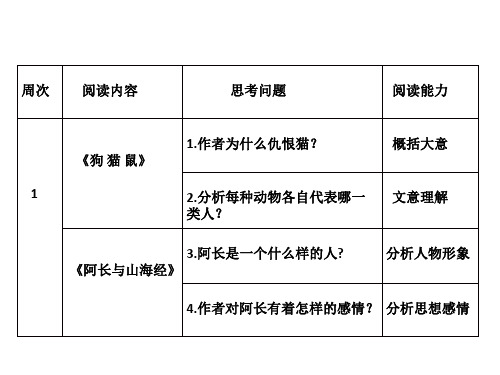
扩展资料
作者仇猫的理由从儿时到现在都是光明正大的;作者追忆童 年时救养的可爱的隐鼠遭到摧残的经历和感受,表明了作者 同情弱小者和憎恶暴虐者的态度。
结尾时在叙及眼前对付“猫们”的态度和策略时,对当时社 会上纵容邪恶,不能除恶务尽的现象进行了鞭挞,同时表现 了作者与军阀斗争到底的韧性战斗精神
写到后半篇,这才正式进入回忆序列:幼时夏夜在桂树底下 听祖母讲猫和虎的故事,自己如何救下被蛇追杀的隐鼠,以 及听说心爱的隐鼠被猫所吃,因而仇猫、打猫的经历。
分析每种动物各自代表哪一类人?
猫代表向下尽情折磨弱者,向上又是一副谄媚状态的 暴虐者。
鼠代表 生活在社会的最底层,最容易遭到压迫和剥削 的底层人士。
狗代表的是喜欢与猫争夺压榨底 层人士权利的一类人。
阿长是个怎样的人?
阿长是一个很不幸而又热望一生平安的劳动妇女,她 没有文化、粗俗、好事,容
思考问题
阅读能力
《狗 猫 鼠》
1.作者为什么仇恨猫?
概括大意
1
2.分析每种动物各自代表哪一 文意理解
类人?
3.阿长是一个什么样的人? 《阿长与山海经》
分析人物形象
4.作者对阿长有着怎样的感情? 分析思想感情
作者为什么仇恨猫?
1、猫的性情和别的猛兽不同,总是尽情折磨猎物才吃下去; 2、与狮虎同族,却一副媚态; 3、到处嗷叫,闹得别人心烦; 4、以为它吃了自己饲养的可爱的隐鼠; 5、伤害了兔的儿女们。
作者对阿长有着怎样的感情?
鲁迅描写了长妈妈善良、朴实而又迷信、唠叨、“满 肚子是麻烦的礼节”的性格,对她寻购赠送自己渴求 已久的绘图《山海经》之事,充满了尊敬和感激,表 达了对这位劳动妇女的真诚的惦念以及对年幼无知的 时光的深切怀念。
水浒传每周阅读计划
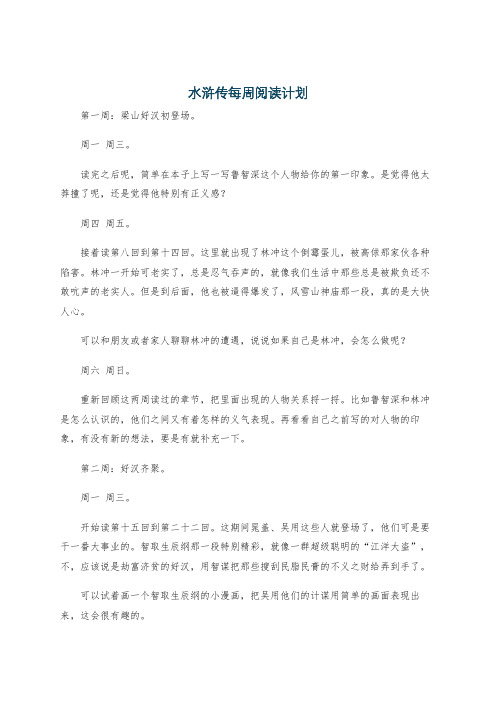
水浒传每周阅读计划第一周:梁山好汉初登场。
周一周三。
读完之后呢,简单在本子上写一写鲁智深这个人物给你的第一印象。
是觉得他太莽撞了呢,还是觉得他特别有正义感?周四周五。
接着读第八回到第十四回。
这里就出现了林冲这个倒霉蛋儿,被高俅那家伙各种陷害。
林冲一开始可老实了,总是忍气吞声的,就像我们生活中那些总是被欺负还不敢吭声的老实人。
但是到后面,他也被逼得爆发了,风雪山神庙那一段,真的是大快人心。
可以和朋友或者家人聊聊林冲的遭遇,说说如果自己是林冲,会怎么做呢?周六周日。
重新回顾这两周读过的章节,把里面出现的人物关系捋一捋。
比如鲁智深和林冲是怎么认识的,他们之间又有着怎样的义气表现。
再看看自己之前写的对人物的印象,有没有新的想法,要是有就补充一下。
第二周:好汉齐聚。
周一周三。
开始读第十五回到第二十二回。
这期间晁盖、吴用这些人就登场了,他们可是要干一番大事业的。
智取生辰纲那一段特别精彩,就像一群超级聪明的“江洋大盗”,不,应该说是劫富济贫的好汉,用智谋把那些搜刮民脂民膏的不义之财给弄到手了。
可以试着画一个智取生辰纲的小漫画,把吴用他们的计谋用简单的画面表现出来,这会很有趣的。
周四周五。
读第二十三回到第二十九回。
武松打虎是这部分的重头戏,武松那可是喝了酒之后就像开了挂一样,赤手空拳就把大老虎给打死了。
还有他在阳谷县的那些事儿,像斗杀西门庆、醉打蒋门神,简直是一路“打怪升级”,成为了大家心中的英雄。
模仿武松打虎的场景,自己演一演,体会一下武松当时的那种勇猛和无畏。
周六周日。
第三周:逼上梁山。
周一周三。
从第三十回读到第三十七回。
宋江这个人物开始在故事里起着越来越重要的作用了。
他在江湖上的名声那是相当大,到处都有人仰慕他。
可是他也有自己的烦恼,被官府追捕,不得不走上梁山的道路。
同时,这期间还有一些其他好汉的故事,像李逵这个“黑旋风”,那是又鲁莽又可爱,对宋江那叫一个忠心耿耿。
做一个人物卡片,一面写宋江,一面写李逵,把他们的性格特点、主要事迹都写上去,就像做游戏卡一样。
第一周每日一练阅读理解

大雪封不住希望的心包利民①有一年冬天,我和表弟徒步去离村几十里外的荒野中抓免子。
在白茫茫的雪野中走了许久,也不见那一行令我们欣喜的印迹。
中午的时候,起了暴风雪,漫天的狂风,无边的大雪甸子上的积雪被风吹得像波涛一样滚动:我和表弟躲在树下,满心的恐慌。
②过了近两个小时,风停了,雪也小了,我和表弟忙着往回赶。
可走了好一会儿,发现周围仍是无边的雪原,雪虽然没有刚才下得大,可我们的足迹还是很快被湮灭。
我们心里一惊,知道是迷了路。
本来在冬天很少能在野外迷路,至少有来时的脚印能引领我们回家。
可是现在,周围除了雪还是雪,没有路。
那些站着的身影,是荒原上稀稀疏疏的树。
③每走到一棵树下,表弟便爬上树去向远处张望,可是这么大的暴风雪过后,很难见到村庄的影子,仿佛大地上的印记都被大雪所埋没。
就这样一路走着,心里焦急万分,如果不能找到村庄,到天黑下来,等着我们的就是黑暗与寒冷,无疑是死路一条。
我们一边走一边纳闷,平时没觉得甸子这么大,怎么周围的村庄一个人都看不见呢?我们本想朝着一个方向走,可是漫天风雪,根本无从辨别方向,只好凭着感觉超某个方向不停地走。
④当表弟再一次爬上一棵树时,他大声喊道:“哥,前边的雪地上有个黑点!”我们精神一振,奋力迈着疲惫的双腿向前方走去。
有的地方雪极深,一脚踩下去能没掉整条腿,这让我们提心吊胆,怕掉进一些被雪填平的深坑里,这极大地影响了我们的速度。
表弟一次次地上树,我们离着那个黑点也越来越近,这是我们唯一的希望了。
⑤终于走到了那个黑点所处的位置,却原来是一口极深的水井。
表弟失望至极,我心里忽然一动,说:“既然这里有井,附近一定有村子!”表弟闻言又来了精神,飞快地爬上一棵最高的树,观望良久,忽然大喊:“哥,我看见那边有一缕续的烟,可能是个村子!”我们立刻向那边出发。
当时已是傍晚,表弟看到的烟,定是村庄的炊烟。
又走了近一个小时,一个村子真的出现在视野里。
天已擦黑,那一刻,我们都躺倒在雪地上,大口地喘着气,放下了心中的巨石。
语文七年级下册课外阅读第一周练习及答案

语文七年级下册课外阅读第一周练习及答案 Modified by JACK on the afternoon of December 26, 20202017年语文七年级下册课外阅读第一周练习一.回家去问妈妈毕淑敏①那一年游敦煌回来,兴奋地同妈妈谈起戈壁的黄沙和祁连的雪峰。
说到丝绸之路上僻远的安西,哈密瓜汁甜得把嘴唇粘在一起……一直安静听我说话的妈妈,淡淡地插了一句:“在你不到半岁的时候,我就抱着你走过安西。
”我大吃一惊,从未听妈妈谈过这段往事。
②妈妈说,你生在新疆,长在北京。
难道你是飞来的不成?以前我一说起带你赶路的事,你就嫌烦,说知道啦,别再啰嗦。
③我静静地倾听妈妈的描述,才知道我在幼年时曾带给母亲那样的艰难。
才知道发生在安西的感动源远流长。
突然意识到,在我和最亲的母亲之间,潜伏着无数盲点。
④我们总觉得已经成人。
母亲只是一间古老的旧房,她给我们的童年以遮避,但不会再提供新的风景。
我们急切地投身外面的世界,寻找自我的价值。
全神贯注地倾听上司的评论,字斟句酌地印证众人的口碑,反复咀嚼朋友随口吐露的点滴印象,甚至会为恋人一颦一笑的涵意彻夜思索……我们极其在意世人对我们的看法,恰恰忘了,当我们环视整个世界的时候,总有一双微微眯起的眼睛,始终在背后凝视着我们。
母亲默默地关注,就像手艺精湛的老艺人,不厌其烦地打磨描绘她们制造的精品。
于是我们厌烦了,不客气地说,老提那些过去的事,烦不烦呀?从此,母亲就真的噤了声。
⑤蓦然回首,才发现自己远远没有长大。
我们幼年的顽皮、成长的艰辛、与生俱来的弱点、异于常人的秉赋……从小到大最详尽的档案、每一次失败与成功的记录,都贮存在母亲宁静的眼中。
我们曾经满世界地寻找真诚,却不知最想要的真诚就在母亲那里。
⑥我们像一本没有结尾的书,每一个符号都是母亲用血书写。
我们还未曾读懂,着者已撒手而去。
从此我们面对书中的无数悬念和秘密,无以破译。
我们流落世间,成为飘零的红叶。
⑦趁老树虬曲的枝丫还郁郁葱葱,让我们赶快跑回家,去问妈妈。
二年级上册人教版语文教学进度表

二年级上册人教版语文教学进度表第一单元:秋天教学内容- 重点词语:叶子、果实、丹麦、雪白、淡黄色- 阅读理解:《秋天的果实》、《有了风》- 诗词欣赏:《一片叶子落下来》教学目标1. 能正确朗读重点词语,并理解其意义;2. 能通过阅读理解文章内容;3. 能鉴赏诗词,感受秋天的美。
教学重点- 学会正确朗读重点词语;- 能理解并运用阅读理解的技巧;- 能理解诗词并感受其中的美。
教学安排- 第一周:讲解重点词语,并进行朗读练。
- 第二周:阅读理解《秋天的果实》。
- 第三周:阅读理解《有了风》,并进行简单写作练。
- 第四周:诗词欣赏《一片叶子落下来》,进行创作活动。
教学资源- 人教版二年级语文教材- 课件- 阅读材料:《秋天的果实》、《有了风》- 诗词材料:《一片叶子落下来》第二单元:小学生的眼睛教学内容- 重点词语:眼镜、翘起- 阅读理解:《我的眼镜》- 诗词欣赏:《眼睛中的星星》教学目标1. 能正确朗读重点词语,并理解其意义;2. 能通过阅读理解文章内容;3. 能鉴赏诗词,感受眼睛的美。
教学重点- 学会正确朗读重点词语;- 能理解并运用阅读理解的技巧;- 能理解诗词并感受其中的美。
教学安排- 第一周:讲解重点词语,并进行朗读练。
- 第二周:阅读理解《我的眼镜》。
- 第三周:诗词欣赏《眼睛中的星星》,进行创作活动。
教学资源- 人教版二年级语文教材- 课件- 阅读材料:《我的眼镜》- 诗词材料:《眼睛中的星星》第三单元:茶馆教学内容- 重点词语:茶馆、茶壶、听众、笑声- 阅读理解:《玩转茶馆》教学目标1. 能正确朗读重点词语,并理解其意义;2. 能通过阅读理解文章内容;3. 能感受茶馆的热闹场景。
教学重点- 学会正确朗读重点词语;- 能理解并运用阅读理解的技巧;- 能感受茶馆的热闹场景。
教学安排- 第一周:讲解重点词语,并进行朗读练。
- 第二周:阅读理解《玩转茶馆》,并进行相关活动。
教学资源- 人教版二年级语文教材- 课件- 阅读材料:《玩转茶馆》第四单元:感谢教学内容- 重点词语:感谢、夸奖、帮助、微笑、礼貌- 阅读理解:《谢谢你,朋友》教学目标1. 能正确朗读重点词语,并理解其意义;2. 能通过阅读理解文章内容;3. 能学会感谢朋友、夸奖他人并展示礼貌。
第一周文言文阅读
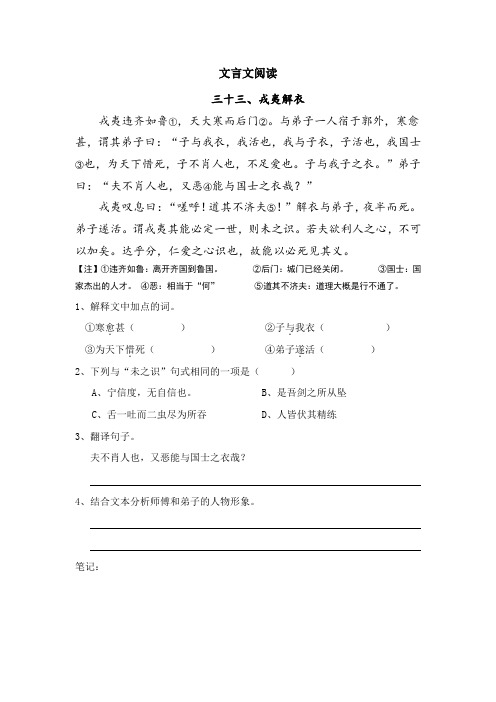
三十三、戎夷解衣戎夷违齐如鲁①,天大寒而后门②。
与弟子一人宿于郭外,寒愈甚,谓其弟子曰:“子与我衣,我活也,我与子衣,子活也,我国士③也,为天下惜死,子不肖人也,不足爱也。
子与我子之衣。
”弟子曰:“夫不肖人也,又恶④能与国士之衣哉?”戎夷叹息曰:“嗟呼!道其不济夫⑤!”解衣与弟子,夜半而死。
弟子遂活。
谓戎夷其能必定一世,则未之识。
若夫欲利人之心,不可以加矣。
达乎分,仁爱之心识也,故能以必死见其义。
【注】①违齐如鲁:离开齐国到鲁国。
②后门:城门已经关闭。
③国士:国家杰出的人才。
④恶:相当于“何”⑤道其不济夫:道理大概是行不通了。
1、解释文中加点的词。
①寒愈.甚()②子与.我衣()③为天下惜.死()④弟子遂.活()2、下列与“未之识”句式相同的一项是()A、宁信度,无自信也。
B、是吾剑之所从坠C、舌一吐而二虫尽为所吞D、人皆伏其精练3、翻译句子。
夫不肖人也,又恶能与国士之衣哉?4、结合文本分析师傅和弟子的人物形象。
笔记:三十四、杞人忧天杞国①有忧天地崩坠②,身亡所寄,废寝食者。
又有忧彼之所忧者,因③往晓之,曰:“天,积气耳,亡处亡气。
若④屈伸⑤呼吸,终日在天中行止⑥,奈何忧崩坠乎?”其人曰:“天果积气,日月星宿,不当坠邪?”晓之者曰:“日月星宿,亦积气中之有光耀者,只使⑦坠,亦不能有所中伤。
”其人曰:“奈地坏何?”晓者曰:“地,积块耳,充塞四虚⑧,亡处亡块。
若躇⑨步跳蹈,终日在地上行止,奈何忧其坏?”其人舍然⑩大喜,晓之者亦舍然大喜。
(选自《列子·天瑞》) 【注】①杞国:周代的国名,在今河南省杞县。
②崩坠:崩塌,坠落。
③因:于是,就。
④若:你。
⑤屈伸:身体四肢的活动。
⑥行止:行动和停止。
⑦只使:即使。
⑧四虚:四方。
⑨躇(chǔ):立。
⑩舍然:舍弃心事的样子。
1、解释下列句子中加点的词语。
(1)身亡.所寄( ) (2)因往晓.之( ) (3)天果.积气( ) (4)躇步.跳蹈( ) 2、翻译句子。
五年级班级读书计划

六、阅读指导:本学期以“走近历史、感受美文”为核心,选择图书指导学生开展主题阅读活动。
二、常规读书达标要求1、制定个人的读书计划,充分合理地利用课余时间来读书。
如安排中午的时间,晚上完成家庭作业后的时间,周六、周日的休息时间。
每天读书不得少于半小时。
2、按照《推荐阅读书目》的要求完成必读书目的阅读。
每位同学每周在老师指导下阅读一篇语文名篇,并积累好词好句到《读书成长记录册》,交老师批阅。
定期举办读书笔记展、读书卡片展。
定期开展读书心得交流、读书沙龙活动、赛诗会活动。
3、每位同学每周至少制作一张读书记录卡、写读书小练笔一篇,学期末评选。
4、每位同学每周在理解的基础上背诵一首古诗,组长检查,教师抽背。
5、每周安排两节课时间,进行读书活动,在班级中形成良好的读书氛围。
6、每位同学每月至少做一份精致的读书小报,内容和主题自定。
7、购买一至两本有意义的书籍,带入学校和同学交换阅读,教师定期检查阅读情况。
8、师生同读一本书,同背一首诗,同过一个读书节,达到师生共同成长。
9、亲子共读一本书,与父母共同学习、成长。
10、学期末评选出班级读书之星。
三、其他读书活动计划安排1、开展“我捐书我受益”活动。
每位同学至少向图书角捐5本以上图书。
(9月)2、开展“我向大家推荐一本好书活动”。
(9月)3、每位同学至少推荐一篇好文章,各学习小组自己设计,装订成册,统一楷体,4号,每篇文章要有推荐人,写明推荐原因。
(10月)4、举行读书演讲比赛,评出班级读书演讲之星。
参加学校组织的读书演讲比赛。
(11月)5、参加学校图书超市活动。
6、开展亲子共读一本书活动。
(11月)7、举行读书知识竞赛活动。
(12月)8、学生对开展活动进行总结,并由教师、家长进行评价。
(1月)书香悠悠——构建书香班级读书计划读书宣言:我们愿以书为友,静心阅读,阅读经典,阅读文化,让读书成为习惯,让学习成为乐趣,做一个爱读书的人,将龙的血脉代代相传。
为了班级文化的建设,为了培养学生的阅读习惯,为了把我班建设成书香班级,在本学期中我将带动全班切实进行班级读书计划,争取取得好成绩。
(新课标)二升三语文阅读与习作暑期升级训练(第一周)及参考答案

嗨!亲爱的小朋友,愉快的暑假开始了。
过完暑假你就上三年级了。
让我们亲近书本,潜心学习。
这一周,我们朗读一组和大千世界相关的美文。
我们可以试着读出句子的语气词和重音,抒发情感;也可以边读边想象,丰富画面;还可以运用学到的词语,把想象的画面写下来,学习表达。
相信你一定能在朗读和表达中感受祖国悠久的历史,汲取爱的力量,许下美好的愿望。
用书香滋养心灵!让我们一起度过这美好的一周吧! (新课标)二升三阅读与习作暑期升级训练(第一周)(复习二年级下册第一至第四单元)第一天第一天 一天 主题阅读 第一天 第一天 暑假一周 学习安排 一天 非连续性阅读 一天 古诗文阅读一天 群文阅读 一天 习作练习语文要素和主题阅读指导第一天主题阅读一(一)阅读儿歌《春风》,完成练习。
春风轻轻吹着口哨(shào),春风轻轻吹着口哨,吹化了冰雪,和小朋友一起欢笑。
吹绿了柳梢(shāo),我削(xiāo)了一支柳笛,吹红了桃花枝头俏(qiào)。
伴着春风吹哨。
小草轻轻钻出地面,听小燕子捎(shāo)来春的问候,山野悄悄换上绿袍。
看我的风筝直上云霄(xiāo)。
1.在儿歌中找出恰当的动词填在括号里。
()口哨()绿袍()柳笛2.儿歌最后一句让我想到了诗句“__________________,忙趁东风放纸鸢”。
3.读句子,根据括号里的提问,用“·”标出重音。
(1)春风轻轻吹着口哨,吹化了冰雪,吹绿了柳梢,吹红了桃花枝头俏。
(春风给冰雪、柳梢、桃花分别带来了什么变化?)(2)听小燕子捎来春的问候,看我的风筝直上云霄。
(谁捎来春的问候?)4.画“____”的句子把“小草”“山野”当作人来写,请用“”在儿歌中再画出一个这样的句子。
5.春风轻轻一吹,我们周围还会发生哪些变化?想一想,选一选,填一填。
(填序号)①柳树②小河③迎春花④燕子()解冻()开放()唱歌()发芽(二)阅读短文,完成练习。
(真题选编)_______________春天来了,温暖的阳光照耀大地。
生物自主学习任务单模板
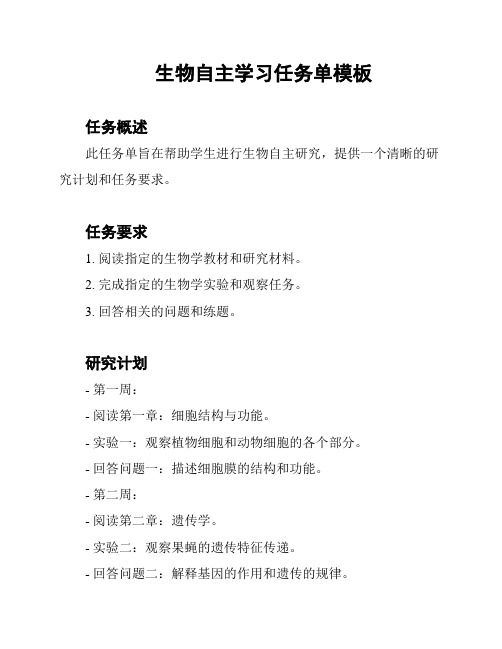
生物自主学习任务单模板
任务概述
此任务单旨在帮助学生进行生物自主研究,提供一个清晰的研究计划和任务要求。
任务要求
1. 阅读指定的生物学教材和研究材料。
2. 完成指定的生物学实验和观察任务。
3. 回答相关的问题和练题。
研究计划
- 第一周:
- 阅读第一章:细胞结构与功能。
- 实验一:观察植物细胞和动物细胞的各个部分。
- 回答问题一:描述细胞膜的结构和功能。
- 第二周:
- 阅读第二章:遗传学。
- 实验二:观察果蝇的遗传特征传递。
- 回答问题二:解释基因的作用和遗传的规律。
- 第三周:
- 阅读第三章:进化论。
- 实验三:模拟岩石鸟嘴的演化。
- 回答问题三:说明进化的原因和方式。
资源
- 生物学教材:《生物学基础》
- 实验材料:显微镜、玻璃器皿、果蝇培养盘等。
自主研究评价
- 学生需在规定时间内完成指定的阅读、实验及问题回答任务。
- 学生将根据完成情况和答案质量进行评分。
提示
- 学生在研究过程中,可以主动查找其他相关资料以丰富知识。
- 在实验过程中,需注意安全操作和保护实验设备。
- 任何不能确定的内容不应直接引用。
注意:上述内容仅为任务单模板,具体任务和要求需根据实际
情况进行调整。
初一英语暑假作业
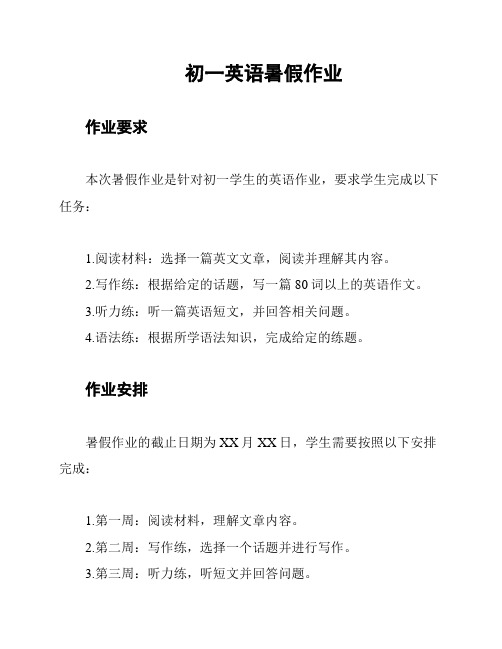
初一英语暑假作业
作业要求
本次暑假作业是针对初一学生的英语作业,要求学生完成以下任务:
1.阅读材料:选择一篇英文文章,阅读并理解其内容。
2.写作练:根据给定的话题,写一篇80词以上的英语作文。
3.听力练:听一篇英语短文,并回答相关问题。
4.语法练:根据所学语法知识,完成给定的练题。
作业安排
暑假作业的截止日期为XX月XX日,学生需要按照以下安排完成:
1.第一周:阅读材料,理解文章内容。
2.第二周:写作练,选择一个话题并进行写作。
3.第三周:听力练,听短文并回答问题。
4.第四周:语法练,完成语法练题。
提交方式
学生需要以电子文档的形式提交作业。
请将阅读材料、写作练、听力练和语法练的答案分别保存为四个文件,并将文件命名为"姓
名-作业类型"的格式,然后发送到老师指定的邮箱地址。
评分标准
暑假作业将根据以下标准进行评分:
1.阅读材料:理解文章内容的准确性和完整性。
2.写作练:语言表达的准确性和连贯性。
3.听力练:正确回答问题的准确性和听力理解能力。
4.语法练:语法知识的正确应用和练题的完成情况。
注意事项
1.请学生们按时完成作业,并注意作业格式和要求。
2.请学生们独立完成作业,不要抄袭他人作品。
3.请老师们确保评分的公正性和客观性。
希望大家能够认真完成暑假作业,提高自己的英语水平!。
五年级语文下册第一周周末阅读

一、阅读短文,完成练习。
(13分)听雨(节选)季羡林从一大早就下起雨来。
下雨,本来不是什么稀罕事儿,但这是春雨,俗话说:“春雨贵似油。
”而且又在罕见的大旱之中,其珍贵就可想而知了。
“润物细无声”,春雨本来是声音极小极小的,小到了“无”的程度。
但是,我现在坐在隔成了一间小房子的阳台上,顶上有块大铁皮。
楼上滴下来的檐溜就打在这铁皮上,打出声音来,于是就不“细无声”了。
按常理说,我坐在那里,同一种死文字拼命,本来应该需要极静极静的环境,极静极静的心情,才能安下心来,进入角色,来解读这天书般的玩意儿。
这种雨敲铁皮的声音应该是极为讨厌的,是必欲去之而后快的。
然而,事实却正相反。
我静静地坐在那里,听到头顶上的雨滴声,此时有声胜无声,我心里感到无量的喜悦,仿佛饮了仙露,吸了醍醐(tí hú)①,大有飘飘欲仙之概了。
这声音时慢时急,时高时低,时响时沉,时断时续,有时如金声玉振,有时如黄钟大吕,有时如大珠小珠落玉盘,有时如红珊白瑚沉海里,有时如弹素琴,有时如舞霹雳,有时如百鸟争鸣,有时如兔落鹘(hú)起,我浮想联翩,不能自已,心花怒放,风生笔底。
死文字仿佛活了起来,我也仿佛又溢满了青春活力。
我平生很少有这样的精神境界,更难为外人道也。
在中国,听雨本来是雅人的事。
我虽然自认为还不是完全的俗人,但能否算是雅人,却还很难说。
我大概是介乎雅俗之间的一种动物吧。
中国古代诗词中,关于听雨的作品是颇有一些的……可我为什么今天听雨竟也兴高采烈呢?这里面并没有多少雅味,我在这里完全是一个“俗人”。
我想到的主要是麦子,是那辽阔原野上的青春的麦苗。
我生在乡下,虽然六岁就离开,谈不上干过什么农活,但是我拾过麦子,捡过豆子,割过青草,劈过高粱叶。
我血管里流的是农民的血,一直到今天垂暮之年,毕生对农民和农村怀着深厚的感情。
农民最高希望是多打粮食。
天一旱,就威胁着庄稼的成长。
即使我长期住在城里,下雨一少,我就望云霓,自谓焦急之情,决不下于农民。
阅读笔记计划表寓言故事
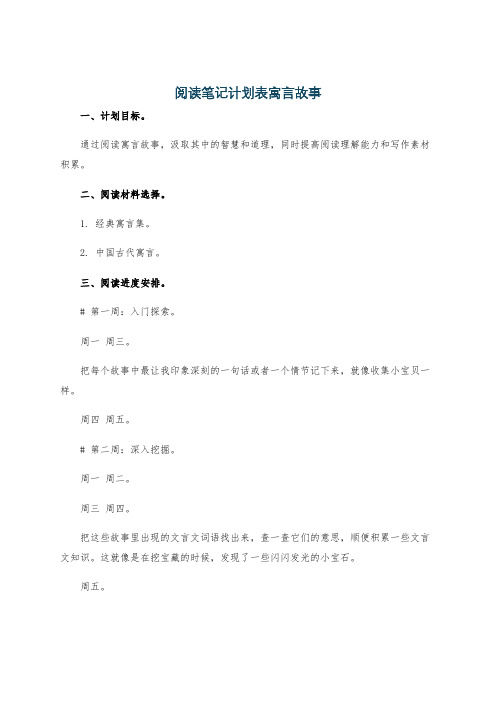
阅读笔记计划表寓言故事一、计划目标。
通过阅读寓言故事,汲取其中的智慧和道理,同时提高阅读理解能力和写作素材积累。
二、阅读材料选择。
1. 经典寓言集。
2. 中国古代寓言。
三、阅读进度安排。
# 第一周:入门探索。
周一周三。
把每个故事中最让我印象深刻的一句话或者一个情节记下来,就像收集小宝贝一样。
周四周五。
# 第二周:深入挖掘。
周一周二。
周三周四。
把这些故事里出现的文言文词语找出来,查一查它们的意思,顺便积累一些文言文知识。
这就像是在挖宝藏的时候,发现了一些闪闪发光的小宝石。
周五。
这一天就回顾一下这一周读的所有寓言故事。
把每个故事的主要情节、人物形象、蕴含的道理和自己的感悟都整理一下,形成一个比较系统的笔记。
就像把散落在各处的珍珠串成一条漂亮的项链一样。
# 第三周:拓展与比较。
周一周三。
对于那些表达相似道理的故事,不管是中国的还是外国的,都把它们放在一起比较。
像中国的“守株待兔”和伊索寓言里的某个类似故事(如果有的话),看看不同文化背景下,人们是怎么用不同的故事来讲同一个道理的。
周四周五。
读一些现代改编的寓言故事或者是带有寓言性质的童话故事。
这些故事可能会有一些新的元素,把它们和传统寓言故事做个比较。
比如说现代故事可能会把故事背景放到太空或者未来世界,但是道理还是那些老道理。
看看这种新瓶装旧酒的方式有没有什么特别之处,把自己的想法写下来。
总结这一周比较阅读的结果,思考不同文化、不同时代的寓言故事的共性和个性,就像在做一个关于寓言故事的大调查一样。
# 第四周:总结与应用。
周一周三。
回顾前三周读过的所有寓言故事,把那些对自己最有启发的故事挑出来,重新阅读一遍。
这一次要深入思考这些故事如何能应用到自己的生活中。
比如如果我想克服自己的懒惰,那“寒号鸟”的故事就可以时刻提醒我。
根据这些故事,写一些小短文,主题可以是“从寓言故事中学到的……”。
把故事中的道理和自己的亲身经历结合起来,让这些道理真正变成自己的东西。
五年级经典阅读导航第一周
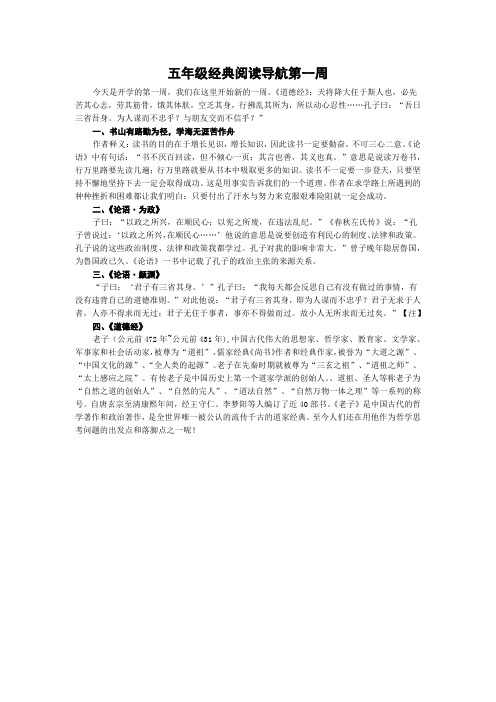
五年级经典阅读导航第一周今天是开学的第一周,我们在这里开始新的一周。
《道德经》:天将降大任于斯人也,必先苦其心志,劳其筋骨,饿其体肤,空乏其身,行拂乱其所为,所以动心忍性……孔子曰:“吾日三省吾身。
为人谋而不忠乎?与朋友交而不信乎?”一、书山有路勤为径,学海无涯苦作舟作者释义:读书的目的在于增长见识,增长知识,因此读书一定要勤奋,不可三心二意。
《论语》中有句话:“书不厌百回读,但不倾心一页;其言也善,其义也真。
”意思是说读万卷书,行万里路要先读几遍;行万里路就要从书本中吸取更多的知识。
读书不一定要一步登天,只要坚持不懈地坚持下去一定会取得成功。
这是用事实告诉我们的一个道理。
作者在求学路上所遇到的种种挫折和困难都让我们明白:只要付出了汗水与努力来克服艰难险阻就一定会成功。
二、《论语·为政》子曰:“以政之所兴,在顺民心;以宪之所废,在违法乱纪。
”《春秋左氏传》说:“孔子曾说过:‘以政之所兴,在顺民心……’他说的意思是说要创造有利民心的制度、法律和政策。
孔子说的这些政治制度、法律和政策我都学过。
孔子对我的影响非常大。
”曾子晚年隐居鲁国,为鲁国政已久。
《论语》一书中记载了孔子的政治主张的来源关系。
三、《论语·颜渊》“子曰:‘君子有三省其身。
’”孔子曰:“我每天都会反思自己有没有做过的事情,有没有违背自己的道德准则。
”对此他说:“君子有三省其身,即为人谋而不忠乎?君子无求于人者,人亦不得求而无过;君子无任于事者,事亦不得做而过。
故小人无所求而无过矣。
”【注】四、《道德经》老子(公元前472年~公元前431年),中国古代伟大的思想家、哲学家、教育家、文学家、军事家和社会活动家,被尊为“道祖”,儒家经典《尚书》作者和经典作家,被誉为“大道之源”、“中国文化的源”、“全人类的起源”。
老子在先秦时期就被尊为“三玄之祖”、“道祖之师”、“太上感应之院”。
有传老子是中国历史上第一个道家学派的创始人。
- 1、下载文档前请自行甄别文档内容的完整性,平台不提供额外的编辑、内容补充、找答案等附加服务。
- 2、"仅部分预览"的文档,不可在线预览部分如存在完整性等问题,可反馈申请退款(可完整预览的文档不适用该条件!)。
- 3、如文档侵犯您的权益,请联系客服反馈,我们会尽快为您处理(人工客服工作时间:9:00-18:30)。
Weekly Reading Materials (1)What matters is what you doOne time or another, you’ve had the thought running through your head that if you only knew more you would be more successful in life.It’s only natural that you think knowing more will make you more successful. Perhaps another degree, a conference, or a DVD business series is what you need to turn your situation around.It’s frustrating.b ecause the more you learn, the less you feel like you’re becoming successful.That’s because, despite what you hea r about success, it has very little to do with formal education. How much you know doesn’t really matter.Some of the most successful people did it without all the education:Steve Jobs stayed in college for only six months. His breakthrough inventions in mobile technology and movie animation are perhaps the greatest business marvel of the last fifty years.Henry Ford had no college education at all. He went on to reinvent the manufacturing process and the entire automobile industry.William Shakespeare dropped out of middle school. He would later create almost 2,000 English words and write the most famous literary works.Horace Greeley had no schooling at all. He would later become a Congressman, and today is considered one the most influential journalists in American history.Albert Einstein was a high school dropout and failed his university entrance exams. He came up with the Theory of Relativity, published 300 scientific papers, won a Nobel Prize, and is considered the greatest mind of the twentieth century.Success isn’t really about how much you know. What matters is what you do.One of the greatest inventors the world has ever know explained success this way: “Genius is 1% inspiration, 99% perspiration.”Thomas Edison didn’t just say that; he lived it. He would attempt over 10,000 separate tries in creating the light bulb.Some people probably thought he was crazy. And some will think you are too. Maybe you’re just on your way to doing something mind-blowingly amazing.How Carl Max learned foreign languagesKarl Marx was born in Germany, and German was his native language. When he was still a young man, he was forced to leave his homeland for political reasons. He stayed in Belgium for a few years; then he went to France. Before long he had to move on again. In 1849, he went to England and made London the base for his revolutionary work.Marx had learned some French and English at school. When he got to England, he found that his English was too limited. He started working hard to improve it. He made such rapid progress that before long he began to write articles in English for an American newspaper. In fact, his English in one of these articles was so good that Engels wrote him a letter and praised him for it. Marx wrote back to say that Engel’s praise had greatly encouraged him.However, he went on to explain that he was not too sure about two things - the grammar and some of the idioms.These letters were written in 1853. In the years that followed, Marx kept on studying English and using it. When he wrote one of his great works, The Civil War in France, he had mastered the language so well that he was able to write the book in English.In the l870s, when Man was already in his fifties, he found it important to study the situation in Russia, so he began to learn Russian. At the end of six months he had learned enough to read articles and reports in Russian.In one of his books, Marx gave some advice on how to learn a foreign language. He said when people are learning a foreign language, they should not translate everything into their own language. If they do this, it shows they have not mastered it When they use the foreign language, they should try to forget all about their own. If they cannot do this, they have not really learned the spirit of the foreign language and cannot use it freely.Want to know how to improve your grades without having to spend more time studying? Sounds too good to be true? Well, read on...How to Improve Y our Study HabitsTerhaps you are an average student with average intelligence. Y ou do well enough in school, but you probably think you will never be a top student. This is not necessarily the case, however. Y ou can receive better grades if you want to. Y es, even students of average intelligence can be top students without additional work. Here's how:1. Plan your time carefully. Make a list of your weekly tasks. Then make a schedule or chart of your time. Fill in committed time such as eating, sleeping, meetings, classes, etc. Then decide on good, regular times for studying. Be sure to set aside enough time to complete your normal reading and work assignments. Of course, studying shouldn’t occupy all of the free time on the schedule. It's important to set aside time for relaxation, hobbies, and entertainment as well. This weekly schedule may not solve all of your problems, but it will make you more aware of how you spend your time. Furthermore, it will enable you to plan your activities so that you have adequate time for both work and play.2. Find a good place to study. Choose one place for your study area. It may be a Array desk or a chair at home or in the school library, but it should be comfortable, and itshould not have distractions. When you begin to work, you should be able toconcentrate on the subject.3. Skim before you read. This means looking over a passage quickly before youbegin to read it more carefully. As you preview the material, you get some idea of thecontent and how it is organized. Later when you begin to read you will recognize lessimportant material and you may skip some of these portions. Skimming helps doubleyour reading speed and improves your comprehension as well.4. Make good use of your time in class. Listening to what the teacher says inclass means less work later. Sit where you can see and hear well. Take notes to helpyou remember what the teacher says.5. Study regularly. Go over your notes as soon as you can after class. Reviewimportant points mentioned in class as well as points you remain confused about. Read about these points in your textbook. If you know what the teacher will discuss the next day, skim and read that material too. This will help you understand the next class. If you review your notes and textbook regularly, the material will become more meaningful and you will remember it longer. Regular review leads to improved performance on test.6. Develop a good attitude about tests. The purpose of a test is to show what youhave learned about a subject. The world won’t end if you don’t pass a test, so don’tworry excessively about a single test. Tests provide grades, but they also let you knowwhat you need to spend more time studying, and they help make your knowledgepermanent.There are other techniques that might help you with your studying. Only a fewhave been mentioned here. Y ou will probably discover many others after you havetried these. Talk with your classmates about their study techniques. Share with themsome of the techniques you have found to be helpful. Improving your study habits willimprove your grades.。
